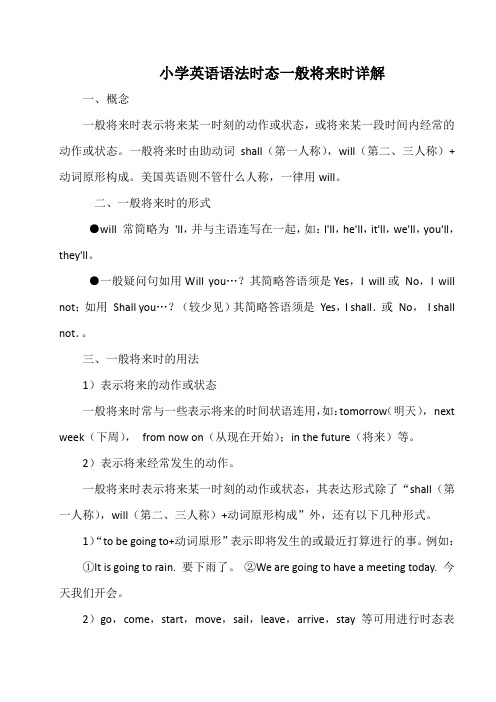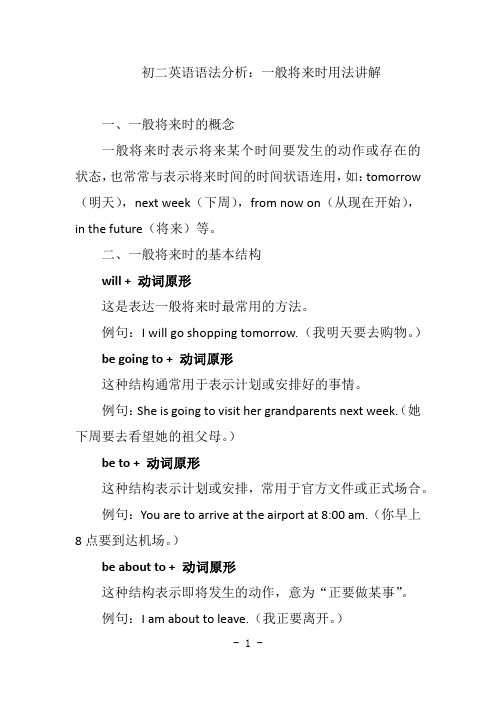一般将来时态讲解
小学英语语法时态一般将来时详解

小学英语语法时态一般将来时详解一、概念一般将来时表示将来某一时刻的动作或状态,或将来某一段时间内经常的动作或状态。
一般将来时由助动词shall(第一人称),will(第二、三人称)+动词原形构成。
美国英语则不管什么人称,一律用will。
二、一般将来时的形式●will 常简略为'll,并与主语连写在一起,如:I'll,he'll,it'll,we'll,you'll,they'll。
●一般疑问句如用Will you…?其简略答语须是Yes,I will或No,I will not;如用Shall you…?(较少见)其简略答语须是Yes,I shall.或No,I shall not.。
三、一般将来时的用法1)表示将来的动作或状态一般将来时常与一些表示将来的时间状语连用,如:tomorrow(明天),next week(下周),from now on(从现在开始);in the future(将来)等。
2)表示将来经常发生的动作。
一般将来时表示将来某一时刻的动作或状态,其表达形式除了“shall(第一人称),will(第二、三人称)+动词原形构成”外,还有以下几种形式。
1)“to be going to+动词原形”表示即将发生的或最近打算进行的事。
例如:①It is going to rain. 要下雨了。
②We are going to have a meeting today. 今天我们开会。
2)go,come,start,move,sail,leave,arrive,stay等可用进行时态表示按计划即将发生的动作,例如:I'm leaving for Beijing. 我要去北京。
3)“be to+动词原形”表示按计划要发生的事或征求对方意见。
例如:①Are we to go on with this work?我们继续干吗?②The boy is to go to school tomorrow.这个男孩明天要去上学。
完整版一般将来时时态用法讲解

般将来时时态1. 一般将来时的定义一般将来时表示在现在看来即将要发生的动作或存在的状态。
常用时间副词tomorrow, soon 或短语n ext year / week / mon th, in a few days, in the future, sometime 做状语。
如:What will you do this afternoon ? 你今天下午干什么?We will have a meet ing tomorrow. 我们明天要开会。
He is going to study abroad (到国外) next year.明年他要出国学习。
2. 一般将来时的结构及应用(1) shall / will + 动词原形。
表示即将发生的动作或存在的状态。
特别是表示客观性的事情或在某条件下要发生的事情,只能用此结构。
如:What shall we do if he doesn '如果他不?来,我们该怎么办?Will you be free this evenin g? 今天晚上有空吗?I think he will tell us the truth (真相)。
我想他会告诉我们真实情况的。
(2) be going to +动词原形。
表示已经计划或安排好了的事情,也可表示有迹象表明肯定要发生的事情。
如:We are going to have a meeting to discuss (讨论)the matter this evening. 今天晚上开会讨论这件事情。
Look at the black clouds over there. I think it is going to rain soon. 看一看那边的乌云,我想天要下雨了。
There is going to be an En glish evening this week. 本周要举行一个英语晚会。
(3) be +现在分词。
一般将来时时态用法讲解

⼀般将来时时态⽤法讲解⼀般将来时时态1. ⼀般将来时的定义⼀般将来时表⽰在现在看来即将要发⽣的动作或存在的状态。
常⽤时间副词tomorrow, soon或短语next year / week / month, in a few days, in the future, sometime 做状语。
如:What will you do this afternoon?你今天下午⼲什么?We will have a meeting tomorrow. 我们明天要开会。
He is going to study abroad(到国外) next year. 明年他要出国学习。
2. ⼀般将来时的结构及应⽤(1) shall / will + 动词原形。
表⽰即将发⽣的动作或存在的状态。
特别是表⽰客观性的事情或在某条件下要发⽣的事情,只能⽤此结构。
如:What shall we do if he doesn’t come 如果他不来,我们该怎么办?Will you be free this evening 今天晚上有空吗?I think he will tell us the truth(真相)。
我想他会告诉我们真实情况的。
(2) be going to + 动词原形。
表⽰已经计划或安排好了的事情,也可表⽰有迹象表明肯定要发⽣的事情。
如:We are going to have a meeting to discuss (讨论)the matter this evening. 今天晚上开会讨论这件事情。
Look at the black clouds over there. I think it is going to rain soon. 看⼀看那边的乌云,我想天要下⾬了。
There is going to be an English evening this week. 本周要举⾏⼀个英语晚会。
(3) be +现在分词。
一般将来时态

this evening
What is the mouse going to do this evening? It is going to do its homework.
will
What is she going to do? She’s going to shop/ go shopping...
They are going to dance.
will
What are they going to do this evening? They are going to watch TV.
will
句式的变化规则:
1.变否定句—---在be/will后加not 。 2.变一般疑问句------将be/will动词提前。 (主语是第一人称I 时,变一般疑问句 时将I 变you) 3.特殊疑问句(也就是对划线部分提问) -----要用特殊疑问词what +一般疑问句。
表示“不肯”、“不能”等: e.g. We asked her to be the director but she won’t agree. Oil and water won’t mix. The car won’t start.
可表示未来情况的还有:
be going to 结构 现在进行时 一般现在时 be about to 结构 be + 不定式结构
系动词am,is,are的原形都是 。 例如: 系动词 , , 的原形都是be。 例如: 的原形都是 People will have robots in their home. 人们的家中将会有机器人。 人们的家中将会有机器人。 There will be one country in the world. 世界上将会只有一个国家。 世界上将会只有一个国家。 shall适用于第一人称 ,We;而will适用于所有人称。 适用于第一人称I, ; 适用于所有人称。 适用于第一人称 适用于所有人称 通常可以用will来代替 来代替shall。 通常可以用 来代替 。 will,shall均可缩写为:'ll,如: 均可缩写为: , , 均可缩写为 I will= I'll; ; she will = she’ll;will not 和shall not分别可以 ; 分别可以 缩写为 won't 和shan't。 。
一般将来时态讲解(共25张PPT)

• I don't think the test will be very difficult. 。
②用于“祈使句 + and + 陈述句” 中
I don’t think it will rain this afternoon.
I am hungry. I think I’ll have something to eat.
表示看法,观点
“There be”句型的一般将来时 肯定句: There will be +名词+其他成份 [注意]:无论后面加单数名词或复数形式,be都必须用原形。
shall适用于第一人称I,We;而will适用于所有人称。 通常可以用will来代替shall。 will,shall均可缩写为:'ll,如:
I will= I'll; she will = she’ll;will not 和shall not分别可以 缩写为 won't 和shan't。
1.一般将来时的用法
4. be about to + 动词原形。 表示 (1)“即将做”或“马上做”
(2)因此,句子不能再用时间状语。
Don’t leave. Li Lei is about to come. 不要走了,李蕾就要来了。 Be quiet. The concert is about to start. 安静下来,音乐演唱会就要开始了。
• My uncle will come to see me every Saturday.
• 我叔叔每个星期六都会来看我。
• The students will have five English classes per week this term.
初二英语语法分析--一般将来时用法讲解

初二英语语法分析:一般将来时用法讲解一、一般将来时的概念一般将来时表示将来某个时间要发生的动作或存在的状态,也常常与表示将来时间的时间状语连用,如:tomorrow (明天),next week(下周),from now on(从现在开始),in the future(将来)等。
二、一般将来时的基本结构will + 动词原形这是表达一般将来时最常用的方法。
例句:I will go shopping tomorrow.(我明天要去购物。
)be going to + 动词原形这种结构通常用于表示计划或安排好的事情。
例句:She is going to visit her grandparents next week.(她下周要去看望她的祖父母。
)be to + 动词原形这种结构表示计划或安排,常用于官方文件或正式场合。
例句:You are to arrive at the airport at 8:00 am.(你早上8点要到达机场。
)be about to + 动词原形这种结构表示即将发生的动作,意为“正要做某事”。
例句:I am about to leave.(我正要离开。
)be due to + 动词原形这种结构表示某事预定或预期将要发生。
例句:The train is due to arrive at 5:00 pm.(火车预定下午5点到达。
)三、一般将来时的用法1表示将来的动作或状态例句:I will buy a new car next year.(明年我要买一辆新车。
)2表示将来的计划或安排例句:We are going to have a picnic this weekend.(我们这个周末要去野餐。
)3表示根据现有情况推测未来的可能性例句:It's going to rain soon.(很快就要下雨了。
)4表示命令、请求、建议等例句:You are to finish your homework before you go out.(你出去之前要把作业做完。
一般将来时态精讲

一般将来时态精讲TPMK standardization office TPMK5AB- TPMK08- TPMK2C- TPMK18一般将来时态精讲(一)一般将来时(de)定义一般将来时表示将来某个时间所发生动(de)作或存在(de)状态,也可表示将来经常或反复发生(de)动作,经常与表示将来(de)时间状语连用, 如:soon, tomorrow,next week, in a few days等.例如:Where will you be this time tomorrow 明天这个时候你会在那儿1. 表示将要发生(de)动作或存在(de)状态.例如:I will return the book in a few days. 我过几天会还这本书.2. 表示将来经常或反复发生(de)动作.例如:They will go to the park every Sunday. 他们将每周日去公园.(二)一般将来时(de)构成一般将来时由“助动词shall/will+动词原形”构成.系动词am, is, are都用动词原形be.1. shall用于第一人称后表示一般将来时,一般只限于肯定句和否定句中.shall通常用于第一人称后,由其构成(de)一般疑问句用来询问对方(de)意见,这时(de)shall不含将来含义,也不可被will替代.例如:There’s no one to answer the phone. What shall we do 没有人接,我们该怎么办2.美国英语中,不论什么人称和数,一律用“will+动词原形”.在口语中,will常缩写为’ll,与主语连写在一起.如:I’ll, you’ll, he’ll, she’ll, we’ll, they’ll;而shall not常缩写为shan’t,will not常缩写为won’t.(三)一般将来时(de)结构1. 肯定句:主语+shall\will+动词原形.I shall\will work next year. 明年我将要工作了.2. 否定句:主语+shall\ will+not+动词原形.I won’t tell anyone what you said. 你说(de)话我不会告诉任何人.3. 一般疑问句:Shall\Will+主语+动词原形—Will you leave for Beijing next week 下周你将前往北京吗—Yes, I will. 是(de),我将要去. No, I won’t. 不,我不去.4. 特殊疑问句“特殊疑问词+一般疑问句”(de)语序,也就是“疑问词+will+主语+动词原形+其他成分”.如果是对主语提问,则主语就不在句子中出现.例如:Who will leave for Beijing next week 下周谁将前往北京(四)There be 句型(de)一般将来时There be 句型(de)一般将来时There will be表示“将来有……”.1. 肯定句:There will be+ 物+ 介词短语+其他.例如:There will be cars in people’s home in the future..将来人们(de)家里会很多(de)小汽车.2. 否定句:There won’t be + 物+介词短语+ 其他.例如:There won’t be any trees in this place in two years.两年后这个地方就不会有树了.3. 疑问句:Will there be +物+介词短语+其他例如:—Will there be less pollution 将来会有更少(de)污染吗—Yes, there will.是(de),会(de).—No, there won’t. 不,不会.(五)be going to 表示将来1.用来表示按计划或安排要发生(de)动作We are going to have a class meeting this afternoon.今天下午我们打算开班会.2.表示推测将要或肯定会发生(de)动作,有“准备;打算”(de)意思.含有be going to 结构(de)句子中往往有表示将来(de)时间状语.例如:Look at the black clouds. It's going to rain.看那些乌云,快要下雨了.结构:肯定句:主语 + be(am,is,are) + going to do sth.否定句:主语 + be(am,is,are)+ not + going to do sth.疑问句:Be(am,is,are)+ 主语 + going to do sthYes, 主语+ am/is/are. / No, 主语+ isn't/aren't. / No, I'm not. They are going to see the car factory next week. (肯定句) They are not going to see the car factory next week. (否定句)-Are they going to see the car factory next week-Yes, they are. (No, they aren't.) (一般疑问句及其回答)注意:There is / are going to be... (注意句型中going to 后面(de)be不能改为have.) 常用来表示将有某事发生.例如:There is going to be a football match next Saturday in our school.下周六我们学校将有一场足球比赛.(六)come, go, leave, arrive,take等表示位置移动(de)动词常用现在进行时表示将要发生(de)动作,它们很少与be going to 结构连用.例如:Miss Sun is coming tonight.今晚孙小姐要来.(七)be going to 和will(de)区别1.will表示说话人认为、相信、希望或假定要发生(de)事,不含任何具体(de)时间,可以指遥远(de)将来;而be going to 指有迹象表明某事即将发生或肯定发生,通常指很快就要发生(de)事情.2. be gong to 和will均可表示意图,但事先考虑过(de)意图用be going to,不是事先考虑过(de)意图用will.一般将来时练习一、单项选择( ) 1. There __________ a meeting tomorrow afternoon.A. will be going toB. will going to beC. is going to beD. will go to be( ) 2. Charlie ________ here next month.A. isn’t workingB. doesn’t workingC. isn’t going toworking D. won’t work( ) 3. He ________ very busy this week, he ________ free next week.A. will be; isB. is; isC. will be; will beD. is;will be( ) 4. There ________ a dolphin show in the zoo tomorrow evening.A. wasB. is going to haveC. will haveD.is going to be( ) 5. –________ you ________ free tomorrow – No. I ________ free the day aftertomorrow.A. Are; going to; willB. Are; going to be; willC. Are; going to; will beD. Are; going to be; will be( ) 6. Mother ________ me a nice present on my next birthday.A. will givesB. will giveC. givesD.give( ) 7. – Shall I buy a cup of tea for you –________. (不,不要.)A. No, you won’t.B. No, you aren’t.C. No, please don’t.D. No, please.( ) 8. – Where is the morning paper – I ________ it for youat once.A. getB. am gettingC. to getD. will get ( ) 9. ________ a concert next SaturdayA. There will beB. Will there beC. There can beD. There are( ) 10. If they come, we ________ a meeting.A. haveB. will haveC. hadD. would have( ) 11. He ________ her a beautiful hat on her next birthday.A. givesB. gaveC. will givingD. isgoing to give( ) 12. He ________ to us as soon as he gets there.A. writesB. has writtenC. will writeD. wrote( ) 13. He ________ in three days.A. coming backB. came backC. will come backD. isgoing to coming back( ) 14. If it ________ tomorrow, we’ll go roller-skating.A. isn’t rainB. won’t rainC. doesn’t rainD. doesn’t fine( ) 15. – Will his parents go to see the Terra Cotta Warriorstomorrow– No, ________ (不去).A. they willn’t.B. they won’t.C. they aren’t.D. they don’t.( ) 16. Who ________ we ________ swimming with tomorrow afternoonA. will; goB. do; goC. will; goingD. shall;go( ) 17. We ________ the work this way next time.A. doB. will doC. going to doD. will doing( ) 18. Tomorrow he ________ a kite in the open air first, and then________ boating in thepark.A. will fly; will goB. will fly; goesC. is going to fly;will goes D. flies; will go( ) 19. The day after tomorrow they ________ a volleyball match.A. will watchingB. watchesC. is watchingD. is going to watch( ) 20. There ________ a birthday party this Sunday.A. shall beB. will beC. shall going to beD. will going to be( ) 21. They ________ an English evening next Sunday.A. are havingB. are going to haveC. will havingD. is going to have( ) 22. ________ you ________ free next SundayA. Will; areB. Will; beC. Do; beD. Are; be( ) 23. He ________ there at ten tomorrow morning.A. willB. isC. will beD. be( ) 24. ________ your brother ________ a magazine from the libraryA. Are; going to borrowB. Is; going to borrowC. Will; borrowsD. Are; going to borrows( ) 25. – Shall I come again tomorrow afternoon –________ (好(de)).A. Yes, pleaseB. Yes, you will.C. No, please.D. No, you won’t.( ) 26. It ________ the year of the horse next year.A. is going to beB. is going toC. will beD. will is( ) 27. ________ open the windowA. Will you pleaseB. Please will youC. You pleaseD. Do you( ) 28. –Let’s go out to play football, shall we – OK. I________.A. will comingB. be going to comeC. comeD. am coming( ) 29. It ________ us a long time to learn English well.A. takesB. will takeC. spendsD. will spend ( ) 30. The train ____ at 11.A. going to arriveB. will be arriveC. is going toD. is arriving二、动词填空1. I ______(leave)in a minute. I ______(finish)all my work before I ______ (leave).2. —How long _____ you _____(study)in our country—I _____(plan)to be here for about one more year.—I _____(hope)to visit the other parts of your country.—What ______ you ______(do)after you ______(leave)here—I ______(return)home and ______(get)a job.3. I ______(be)tired. I ___________(go)to bed early tonight.4. Mary’s birthday is next Monday, her mother __________(give)her a present.5. It is very cold these days. It ___________(snow)soon.6. —_____ you _____(be)here this Saturday —No. I ___________(visit)my teacher.7. —______ I ______(get)you a copy of today’s newspaper —Thank you.8. I am afraid there ______(be)a meeting this afternoon. I can’t join you.9. Mike ___________( not , believe)this until he ______(see)it with his own eyes.10. Most of us don’t think their team ______(win).三、句型转换.1. People in the north often go skating in winter. (next winter)________________________________________________________________________ ______2.There are two cinemas in that town. (next year)________________________________________________________________________ ______3.He comes back late.(in two days)________________________________________________________________________ ______4.She is a conductor of a train.(soon)________________________________________________________________________ ______5.Li Ming is ten years old.(next year)________________________________________________________________________ ______6.I sometimes write to my mother in the evening.(tonight)________________________________________________________________________ ______7.He went there by plane.(some day next year)________________________________________________________________________ ______8.China is a modern and strong country.(in twenty years)________________________________________________________________________ ______9.Do you study hard(from now on)________________________________________________________________________ ______10.She didn’t speak English at the meeting.(before long)________________________________________________________________________ ______。
英语语法:一般将来时解释集

英语语法:一般将来时解释大全一、基本定义一般将来时是英语时态的一种,表示将来的动作或状态。
它主要用于描述未来的计划、预测或期望发生的事情。
二、形式构成一般将来时的构成主要有以下几种形式:1. 基本结构:主语+ will /shall + 动词原形+ 其他成分。
这是最基本的一般将来时形式,表示将来的动作或状态。
2. be going to 结构:主语+ be(am, is, are)going to + 动词原形+ 其他成分。
这种结构表示计划或安排将要发生的事情,也可以表示根据目前的迹象或情况预测将会发生的事情。
3. be+动词不定式:主语+ be(am, is, are)to + 动词原形+ 其他成分。
这种结构表示计划或安排将来要做的事情。
4. be+动词ing:主语+ be(am, is, are)+ 动词ing形式+ 其他成分。
这种结构表示即将发生的动作,通常与“when”连用。
5. be+表示时间的介词短语:主语+ be(am, is, are)+ 表示时间的介词短语。
这种结构用于表示将来某个时间点的情况。
6. 将来时间状语:tomorrow, next week, in the future等以上就是一般将来时的主要构成形式。
需要注意的是,在具体使用时,应根据语境和上下文选择合适的构成方式。
三、用法场景1. 表达未来的计划或意图,例如:I will go to the beach next summer.2. 描述未来的预测或期望,例如:It will rain this afternoon.3. 在条件句中表示将来的结果,例如:If you study hard, you will pass the exam.四、与其他时态的区别1. 与现在进行时态的区别:现在进行时态强调正在进行的动作,而一般将来时态强调将来的动作或状态。
2. 与过去时态的区别:过去时态表示过去的动作或状态,与将来时间无关。
- 1、下载文档前请自行甄别文档内容的完整性,平台不提供额外的编辑、内容补充、找答案等附加服务。
- 2、"仅部分预览"的文档,不可在线预览部分如存在完整性等问题,可反馈申请退款(可完整预览的文档不适用该条件!)。
- 3、如文档侵犯您的权益,请联系客服反馈,我们会尽快为您处理(人工客服工作时间:9:00-18:30)。
“There be”句型的一般将来时 肯定句: There will be +名词+其他成份 [注意]:无论后面加单数名词或复数形式,be都必须用原形。
There will be only one country. 否定句:在will后面加not.
There won’t be only one country. 一般疑问句:把will提到there之前。
They won’t use books.
一般疑问句:把will 提到句子主语之前,结尾变问号。
Will students go to school in the future?
特殊疑问句:特殊疑问词+will +主语+动词原形+其他?
What will your dream school have?
Will there be only one country? Yes, there will. / No, there won’t.
用所给词的适当形式填空:
1.There will be (be ) an American film next week.
2.They will finish (finish) the work this afternoon.
6.He will be
(be) back in three hours.
7.We will send (send) for a doctor if
you
are
(be) not better in the evening.
• 3.其他一般将来时态结构
• 1.现在进行时表将来(be + doing) • 表示某个按最近的计划或安排即将要进行的动作,an arrangement
• That bag looks heavy. I'll help you with it. • I won't tell anyone what happened, I
promise. • ④表示一种倾向或推测 • Flowers will die without water. • Water will change into ice at 0℃. • This will be your sister, I guess.
3.Tom will play (play) football with us tomorrow.
4.Robots will do
(do) lots of work in our homes
in the future.
5.Ttrong winds tonight.
• ①表示将来某一时间将要发生的动作或 存在的状态, I shall be free this afternoon.
• There'll be no chemistry classes tomorrow.
• They will probably go to Shanghai for their holiday.
will 引导的一般将来时的各种句式
最基本的结构:will + 动词原形 “主谓(宾)句型”的一般将来时: 肯定句:主语+ will +动词原形+(宾语)+其他
Some day people will go to the moon.
否定句:在will 的后面加not即可。will not 可缩写为 won’t
2.常见表示将来的时间状语:
• 描述一个即将要发生的动作;谈论未来的 计划和打算。
• next Tuesday,tomorrow, next week, tonight, the coming Sunday, in a few minutes, next year, in the future, this afternoon, in five years
• My uncle will come to see me every Saturday.
• 我叔叔每个星期六都会来看我。
• The students will have five English classes per week this term.
• 本学期学生们每周要上五节英语课。
③表示同意或答应做某事
一般将来时the future tense
含义:表示将来发生的动作或状态。
基本结构:1.主+will / shall +动词原形 2.主+be going to+动词原形
系动词am,is,are的原形都是be。 例如: People will have robots in their home. 人们的家中将会有机器人。 There will be one country in the world. 世界上将会只有一个国家。
• 注意:在口语中,常用will / shall + be doing结构来代替will / shall + 动词原形, 以表示生动。
• I‘ll be seeing a friend off at the airport.
• He'll be going with us tomorrow.
②表示将来某一段时间内经常发 生的动作或存在的状态。
shall适用于第一人称I,We;而will适用于所有人称。 通常可以用will来代替shall。 will,shall均可缩写为:'ll,如:
I will= I'll; she will = she’ll;will not 和shall not分别可以 缩写为 won't 和shan't。
1.一般将来时的用法
for the near • future或即将开始或结束的动作。
• 常用动词位置移动词:go, leave, come, arrive, land, meet, move, return, start, stay, stop, do, dine, give, have, pay, join, publish, spend, sleep, take, change, fly, work, wear, see, play etc.
但有时不一定指未来的事情
• 用于I think (don’t think) …will…的句型: e.g. I think Diana will pass the exam. I don’t think it will rain this afternoon. I am hungry. I think I’ll have something to eat.
